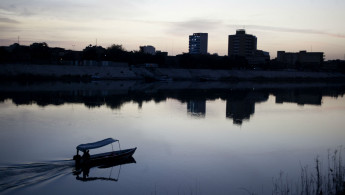The day the music died in Baghdad
If you walk along the banks of Baghdad's Tigris River, you will no longer hear the sweet melancholic voice of Fairuz in the morning.
Since the 1970s, residents of the Iraqi capital would hear the sound of Fairuz's voice sing sweetly about Baghdad – "The poets and the images of the golden age that emanate their sweet fragrance."
On Dar al-Salam radio morning show, the DJ no longer pauses between Fairuz's songs to wish Iraqis a good day.
| In the past we couldn’t even imagine these atrocities. - Majid al-Tamimi, Baghdad river police |
Before the war, this was done at 6am every morning.
All of this has come to an end.
Morning is broken
Dar al-Salam radio no longer plays Fairuz's songs of peace and love, and instead the daily scenes of dead bodies recovered from the River Tigris are accompanied by the sound of weeping, wailing, and ambulance sirens.
Those involved in the killing have not thought about giving themselves a day off or changed the dumping ground of their victims, in clear defiance of the rule of law and proof of the weakness of the Iraqi security services.
This month, reports suggest a rise in the number of sectarian killings in Baghdad with 15 bodies discovered each day. Half of the victims are disposed in or around the Tigris.
The bodies are recovered by the police’s river rescue team or groups of local men who are paid by the victims’ families to retrieve their bodies. They usually find them on the river bank or under bridges.
"The majority of victims are killed then thrown in the river," says Majid al-Tamimi, a colonel in Baghdad’s river police force.
"The killers use the Tigris to cover up evidence of their crimes and get rid of the bodies. For the most part they kill more than one person. Most of the victims are young men between 18 and 40 years of age and all come from a certain segment of society, which is the reason for their killings."
Tamimi says that all fingers point to Baghdad's myriad of militias for the crimes. These are unsurprisingly quick to deny the accusations.
The colonel says that he has grown used to the daily sight of dead bodies.
"We're now used to living our lives as if nothing has happened. In the past we couldn’t even imagine these atrocities," he says.
Finger pointing
Private newspapers and television shows are full of these stories. The state-run channels, in effect run by the political parties and allied militias that are in government and considered to be behind these crimes, do not appear to consider the daily reports of dozens of corpses being discovered in Baghdad newsworthy.
An Iraqi fraternity organisation, Ikhaa, that aims at building bridges between different sectarian communities in Iraq, released a report that showed more than 10,000 families have fled Baghdad fearing sectarian kidnappings and murders.
"The government is trying to overlook the issue to avoid clashing with the sectarian militias, which are the only party implicated in the killings that are being committed on sectarian grounds," says Ayman al-Tawil, the head of Ikhaa.
"These are not killings based on money, tribal disputes or revenge."
Tawil says that the government also seems undisturbed by the daily findings of 10 to 15 bodies in the Tigris and Euphrates due to a much more pressing issue, the threat of the Islamic State group (IS, formerly Isis) in the north.
| These dead bodies will be the straw that breaks the camel's back. -Ayman al-Tawil, Ikhaa |
"The reality is that these dead bodies will be the straw that breaks the camel's back and it will be the factor for an escalation to the already prevalent sectarian conflict in the country."
Sectarian motives
A number of Islamic clerics have issued fatwas forbidding the consumption of fish from the river because of fears that they have been contaminated by the dozens, possibly hundreds, of corpses that lie on the river bed.
"I have advised people to avoid eating fish that is caught from the Tigris around Baghdad, Diyala and Salah al-Din provinces because of the corpses found in these places," says Sheikh Ahmad Abd al-Karim al-Mosuli from the Imam at al-Fadhala mosque in Baghdad.
"Some clerics have gone as far as outright forbidding it. This is a disaster, we have fallen between the hammer of the Islamic State group and the anvil of the extremist militias."
Iraq's healthy ministry yesterday warned that a number diseases contracted from dead bodies have been spreading in Baghdad.
"New and dangerous diseases have stated to spread in Iraqi society for a number of reasons, including the dead bodies," Ahmad al-Rudaini, the ministry spokesperson told the Iraq Press Agency.
"Ministry statistics show around 1,000 people have contracted leishmaniasis, known as Baghdad Boils, because of the living conditions of refugees are full of sandflies, which transmit the skin disease."
"Scabies has also spread in Baghdad because of the dead bodies and the build-up of waste. Some people have resorted to going to private clinics instead of state hospitals for treatment."
Taha al-Ubaidi, of the Alliance for Iraqi forces, told al-Araby al-Jadeed that, "The bodies in the Tigris are a disgrace to Prime Minister Haider al-Abadi's government because he knows who the killers are. Baghdad has seen over 55 dead bodies recovered in just two weeks. Among the dead were university students, workers and labourers."
Ubaidi says that such is the lack of faith in the authorities that activists opposed to the violence are ignoring the government and heading to the Shia-majority city of Najaf to speak to Islamic leaders to intervene and stop the killing.
If the violence doesn't stop now, then it has there is a potential for a massive country-wide civil war to break out.
"If that happens, the violence will not end until the Tigris flows red," he says.
This article is an edited translation from our Arabic edition.



